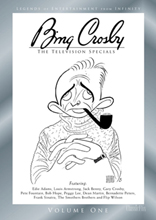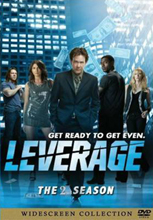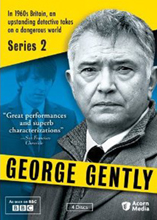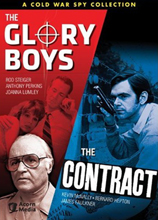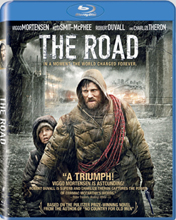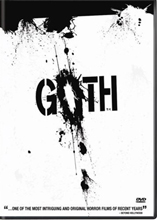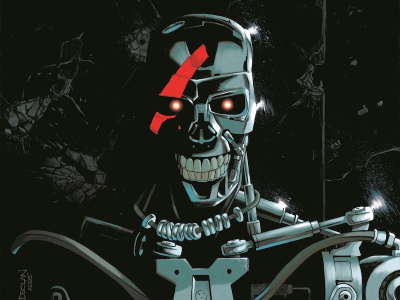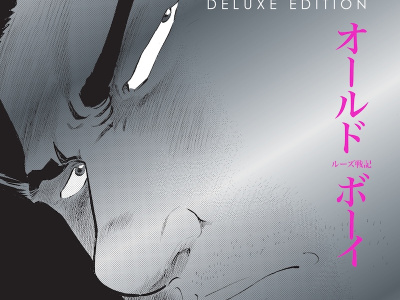
Once again there is more of interest in the “Anime,” “TV on DVD,” and “Foreign Films” categories than in “Theatrical Films.” A skillful new version of the Full Metal Alchemist saga debuts on Blu-ray, while cult hit TV series such as Leverage and True Blood along with a solid contingent of UK offerings provide plenty of opportunities, and one of the most interesting recent Japanese horror movies and a vintage British film noir also enliven this week’s offerings, which also include a brilliant performance from Viggo Mortensen in one of the grimmest films in years.
Anime
The big news this week is the release of Full Metal Alchemist: Brotherhood Season 1: Part 1 (Funimation, “14+,” 320 min., $49.98, BD $54.98). As is the case with the makeover of the Neon Genesis Evangelion TV series into a series of movies, FMA: Brotherhood provides a sparkling new version of very familiar material, namely the original FMA TV anime series from Bones—a series that was extremely successful in its own right thanks to airing on the Cartoon Network’s Adult Swim. But the original FMA anime was created while the manga series it was based by Hiromu Arakawa was still ongoing. Now that the manga series is ending, Bones is producing a new series that follows the narrative of the manga much more closely. Full Metal Alchemist: Brotherhood, which is currently airing on Adult Swim on Saturday nights, is an improvement on the original anime and it looks spectacular in this Blu-ray collection of the series’ first 13 episodes. It’s not like the first series was “chopped liver,” it was very good also and the basic plot of the two series remains the same. Surely there are plenty of anime fans who wish that Bones had poured the effort into creating an entirely new anime series rather than into perfecting Full Metal Alchemist, but the improvements in the new series, which does hew much closer to the excellent FMA manga, along with the visual and audio upgrade provided by Blu-ray, make the FMA: Brotherhood BD the definite anime release of the week.
Also out this week is Hell Girl: Two Mirrors Collection 1 (Sentai Filmworks, “16+,” 325 min. $49.98), which includes the first half (13 episodes) of the second season of the anime series produced by Aniplex and Studio Deen. Funimation released the first season of this series about a female demon girl who responds to grudges (which often involve bullying) by providing the aggrieved party with a measure of revenge. But the price of payback is high for the petitioner must surrender his or her own soul. Because of the nature of its narrative, Hell Girl is much more episodic than the typical TV anime series. It is also one of the most stylish of the current “goth” anime series, and hopefully it will do well enough in the subtitle-only multi-disc release that Sentai will be able to release not only the second half Hell Girl’s second season, but also season 3, which aired in Japan in 2008 and 2009.
Sayonara, Zetsubou-Sensei Vol.1 (Media Blasters, 150 min., $24.99), which is based on the Kodansha Award-winning manga by Koji Kumeta (published here by Del Rey), is a clever comedy about a terminally pessimistic schoolteacher who has a negative outlook on everything and through his over-the-top reactions, the anime and manga manage to satirize Japanese media, politics, and culture to great effect. Another new series debuting on Tuesday is Kanokon Vol.1 (Media Blasters, “13+,” 100 min., $19.99), a harem fantasy comedy about a high school student who moves from the country to the city only to be deviled by a sexy girl, who just happens to be a fox demon. The other major single-disc release is Bleach Vol.28 (Viz Media, “13+,” 100 min. $24.92), the latest installment of the popular series that airs on Adult Swim.
Funimation is also releasing the second portion of the second season of the high school martial arts comedy Kenichi: The Mightiest Disciple Season 2 Part 2 (“13+,” 280 min. $49.98) along with the bargain-priced Kenichi: The Mightiest Disciple Season 1 Complete Set (Funimation, “13+,” 600 min. $59.98). Other bargain releases include The Air Gear Complete Collection (Funimation, “17+,” 650 min. $49.98), based on the seinen manga by Oh Great!, and Armored Fleet Dairugger Collection 2 (Media Blasters, “13+,” 450 min., $34.98), the robot anime that was the basis for the 1980s Voltron cartoon series.
TV on DVD
One of the top offerings out this week is Leverage: The Second Season (
Also due out this week is the stylish HBO vampire series True Blood: The Complete Second Season (720 min., $59.98), which is also coming out on Blu-ray ($79.98) and the first set from the USA series Royal Pains: Season 1 (Univeral, 600 min., $59.98) about a young ER doctor, who moves to the Hamptons to become a reluctant medico for hire to the rich and famous.
Vintage western series out this week include The Virginian: The Complete First Season: Collector’s Tin (Timeless Media, 2370 min., $79.98), which includes all 30 episodes of 90-minute, long-running (1962-1971) series that aired on NBC and featured major guest stars such as Bette Davis, Lee Marvin, and George C. Scott, and The Deputy: TV Western Classics (Timeless Media, 870 min., $39.98), which includes episodes from multiple rarely-seen series such as The Deputy (Henry Fonda), The Tall Man (Barry Sullivan), Cimarron City (George Montgomery), The Restless Gun (John Payne), Frontier Doctor (Rex Allen), and Shotgun Slade (Scott Brady).
Old school music fans will certainly enjoy Bing Crosby: The Television Specials, Vol.1 (Infinity, 245 min. $29.98), a two-disc collection of TV specials featuring Der Bingle and a host of guest stars. Crosby’s effortless baritone and placid demeanor tend to obscure his subtly swinging musical gifts, which are on display in this series of specials, especially in the legendary 1959 Oldsmobile-sponsored show that featured the equally legendary Frank Sinatra, Louie Armstrong, and Peggy Lee all at the height of their considerable powers—a show that is worth the price of this set all by itself.
The top import series this week is George Gently Series 2 (Acorn Media, 356 min., $59.99), a four-disc set that includes a quartet of feature-length mysteries that aired on BBC One in 2009. Martin Shaw stars as Inspector George Gently and Lee Ingleby portrays his Detective Sergeant John Bacchus. Based on the novels by Alan Hunter and set in Northumberland and County Durham the 1960s, the Gently mysteries have a strong psychological component that more than makes up for an evocation of the 1960s that can’t quite match Foyle’s War’s brilliant reconstruction of the 1940s or Life on Mars’ meticulous recreation of the1970s.
Equally interesting is The Glory Boys/ The Contract: A Cold War Spy Collection (Acorn 308 min., $39.98), a box set containing two excellent mini-series. Produced in 1984 and directed by Michael Ferguson (Doctor Who), The Glory Boys is a thriller in which Tony Perkins stars as a British agent attempting to foil an IRA/Palestinian plot to kill an Israeli nuclear scientist (Rod Steiger) visiting London, while The Contract features Kevin McNally (Joshamee Gibbs in Pirates of the Caribbean) as a British agent called back into service to help a leading Soviet missile designer defect. The Contract is a particularly adept cold war espionage tale adapted by Gerald Seymour from his own novel. This white-knuckle cold war thriller features a strong British and German cast and excellent locations in the U.K, and
Foreign Films
One of the most interesting Japanese horror films of recent years, Gen Takahashi’s Goth (Well Go, Unrated, 95 min. $19.98), which debuted in
The British author James Hadley Chase, who had never been to the States, used maps, a book of American slang, and a familiarity with tough guy crime writing of the Black Mask school to create No Orchids for Miss Blandish, an ultra-violent and sexy crime thriller that was published in 1939. Miss Blandish was a million copy seller and reportedly the favorite novel of British troops during World War II. Chase combined news accounts of the sensational exploits of the gang led by the notorious Ma Barker with a “Stockholm syndrome” plot stolen from William Faulkner’s Sanctuary. Chase, who wrote over 80 novels, created spare, plot-driven narratives, which, if they weren’t the equal of the top level of American crime writing (Hammett, Chandler, Cain, Woolrich), were nevertheless hugely successful, especially in Europe. Though supposedly set in
What was too shocking for American audiences in the late 1940s is fairly tame stuff now, though the casual cruelty of the film’s numerous execution-style killings (which closely follow similar activities in the book) still has a chilling power. George Orwell in his essay “Raffles and Miss Blandish” got it right—everything in Miss Blandish is driven by power, the small time gangsters are wiped out by a bigger, more organized mob, which eventually falls victim to the actions of a detective (Fenner, who is inexplicably referred to as a “newspaperman” in the movie) and the police, who are equally ruthless and amoral. Of course the power dynamic is at the core of most gangster films, but Chase distills it down to its pure essence where it callously trumps friendship, loyalty, or any other sort of social bond.
While the violence of No Orchids makes it to the screen largely unfiltered, the sexual themes of the novel in which the rich and bored Miss Blandish is in sexual thrall to the slobbering, sadistic, and initially impotent (another touch directly borrowed from Faulkner by Chase) Slim Grissom are replaced by a rather conventional “across the tracks” romance between a society dame and a gangster, who may be a murderer, but who treats her like a gentleman and even offers to let her go. Slim is played by the only American actor in the cast, Jack LaRue, who ironically played a similar role in
The good news is that the careful restoration of No Orchids for Miss Blandish has produced a DVD that is sharp and extremely watchable. The bad news is that Miss Blandish didn’t have a director with the skills of a John Boulting (Brighton Rock) or Alberto Cavalcanti (They Made Me a Fugitive), who could have raised it above the level of an interesting period piece--a "must-see" for film noir fans, but a "skip it" for most others.
Theatrical Films
It must be the week for literary adaptations of all types. The top theatrical release is John Hillcoat’s adaptation of Cormac McCarthy’s Pulitzer Prize-winning novel The Road (Sony, “R,” $27.96, BD $34.95). While this post-apocalyptic tale has some science fiction and horror elements, it is a serious work that won’t necessarily appeal to all genre movie fans. It does have at its core a brilliant performance by Viggo Mortenson (LOTR) as a father who is attempting to migrate southward with his young son through a devastated American landscape where most plant and animal life have been obliterated and much of the remnants of humanity reduced to cannibalism. The look of the film is extraordinarily grim, dark, gray and sunless, and its portrayal of the wasteland created by the unspecified disaster is truly haunting, especially on the meticulously rendered Blu-ray version.
Dear John (Sony, “PG,” $28.95) is a literary adaptation of a different sort. An unabashed tearjerker, which benefits from solid performances from Amanda Seyfried and Channing Tatum as well as sensitive direction from Lasse Hallstrom, Dear John was adapted from the novel by Nicholas Sparks (The Notebook), who is evidently waging a one-man campaign to bring back “the weepie.”



